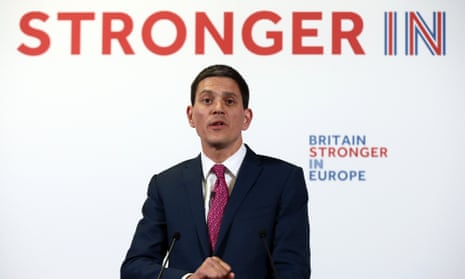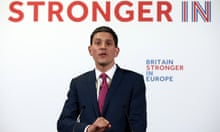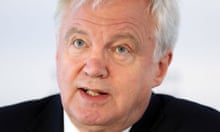David Miliband has made a dramatic entry into the debate about Britain’s exit from the EU with an impassioned call for politicians from all parties to work together to avoid the Tory high command driving the country “off a cliff”.
Labour’s former foreign secretary warned that Brexit is an “unparalleled act of economic self-harm” and suggested that it is up to MPs of all political colours to fight back against its worst consequences. The country’s future, he argued, should be decided by another vote on the terms of a final settlement – either by referendum or in parliament.
In a scathing article in the Observer, Miliband wrote: “Delegating to May and Davis, never mind Johnson and Fox, the settlement of a workable alternative to EU membership is a delusion, not just an abdication.”
He also heaped praise on the Tory chancellor, Philip Hammond, who is leading pressure inside the cabinet for a transition deal with the EU to soften the blow of a Brexit rupture. “I never thought I would say this, but Philip Hammond is also playing an important, even valiant, role. A transition of the kind he has advocated is vital.”
The timing of the intervention by the former contender for the Labour leadership is significant. Febrile Westminster talk over the summer recess has triggered speculation about the creation of a new anti-Brexit party joined by heavyweights from all sides.
But a more likely scenario is the emergence of cross-party consensus around a plan for the UK to remain part of the European Economic Area (EEA), at least for a transition period. This would provoke fury among leavers and civil war within the Tories.
Now president and chief executive of the International Rescue Committee, based in New York, Miliband recently indicated that he sees himself as an “ex-politician”. But many believe he harbours a desire to return to Westminster and his caustic assessment of both the UK and US political scenes suggests he believes they are in need of a shake-up.
In his most hard-hitting comments to date concerning both Britain’s decision to leave the EU and the Trump presidency, Miliband warns that “politics and government are setting new standards for dysfunction”.
“This transatlantic malaise has a common root,” Miliband wrote. “Politics based on what you are against, not what you are for. Look at the campaigns against the Affordable Care Act (Obamacare) and against the EU. There is a common trope: the politics of grievance.” He claims that the UK is suffering a governability crisis. “Leaving the EU was mis-sold as a quick fix,” Miliband wrote. “Now it looks like a decade-long process of unscrambling the eggs of the national and European legislation. Ministers cannot even agree among themselves the destination, the route map, or the vehicles to get us there.”
But the case against the EU depends on avoiding a discussion of the alternative, Miliband believes. “It is the equivalent of voting to repeal Obamacare without knowing the replacement. It is a stitch-up. That is one reason it is essential that parliament or the public are given the chance to have a straight vote between EU membership and the negotiated alternative.”
In an attempt to broaden the debate, Miliband made an impassioned plea for the EU to be seen as more than an economic bloc.
“The EU is not just a group of neighbouring countries. It is a coalition of democratic states which pledge to advance human rights, the rule of law and democratic rules. That is not a threat to Britain; it is the team we should be on.”
In recent weeks, Labour MPs Stephen Kinnock and Heidi Alexander and the Conservative Lord Hague have called for the UK to remain a member of the EEA – the regional free trade area that, in addition to all EU member states, includes Norway, Iceland and Liechtenstein.
Supporters of Britain adopting an EEA “off-the-shelf option” say that it would allow for a smooth exit with minimum disruption for British business while maintaining access to the single market. Kinnock, who believes there may be 15 Tory MPs sympathetic to his plan for Britain to remain part of the EEA – enough for the government to lose a vote on the issue – said it would buy “time to negotiate the final state deal with the EU. It delivers certainty for business and workers, and it allows us to reform freedom of movement.”
The latter point is controversial. Liechtenstein has powers to restrict freedom of movement but it is a tiny country. Attempts by the UK to negotiate a similar deal are likely to be bitterly contested by Brussels.
The EEA idea, however, has found favour with Hammond. The government opposes the plan but Labour appears to be softening its stance and Miliband’s powerful intervention may help to sway the party’s rank and file.






Comments (…)
Sign in or create your Guardian account to join the discussion